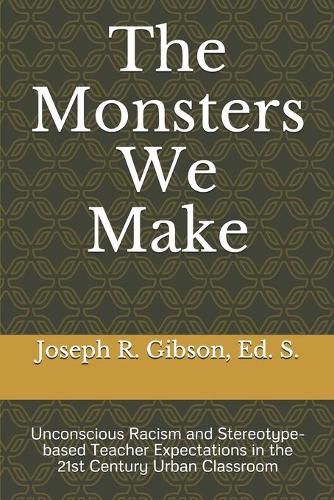Readings Newsletter
Become a Readings Member to make your shopping experience even easier.
Sign in or sign up for free!
You’re not far away from qualifying for FREE standard shipping within Australia
You’ve qualified for FREE standard shipping within Australia
The cart is loading…






Please check out more of our related titles at thePGI.org/global-press!The overwhelming majority of urban teachers in America are unconsciously racist, much like various studies have confirmed that the overwhelming majority of people in America, both Black and White, are unconsciously racist. And even if this was only fractionally true, unconscious racism in the urban classroom is arguably the most important social justice issue of our time.Unconscious racism is more prevalent in American society in general, and predictably more in the urban classroom in particular, than generally acknowledged. Sharon Begley identified that although many white Americans consider themselves unbiased, when unconscious stereotypes are measured, some 90% implicitly link blacks with negative traits [such as] evil or failure. Regrettably, Black people also tend to have unconscious, internalized stereotype-based, anti-Black biases. Although we usually do not know enough about the Pygmalion effect to use it as a conscious and purposeful teaching tool, most teachers, wrote Tauber, recognize that holding high or low expectations, and then acting on those expectations, can create a self-fulfilling prophecy. But what we typically don’t recognize at all is the impact unconscious racism has on our expectations, especially as urban teachers. When we look into our urban classrooms, psychologically we are more inclined to see a room full of people that, for no reason other than their skin color, are particularly lazy, violent, unintelligent, bad, irresponsible, inhuman, underachieving, entertaining, athletic, dangerous, poor, menacing, hypersexual, amoral, apathetic, hostile, incarceration-prone, unqualified, problematic, attitudinal, self-destructive, uncooperative, diabolical, ugly, criminal, drug dealing or addicted, disrespectful, gang-related, excuse-dependent, complaint-oriented, failure, affected by some undesirable condition, and generally inferior.These almost exclusively negative stereotypes have collectively demonized African-Americans for centuries and continue to do so. The most urgent problem is that now this demonization is discreetly occurring in most urban classrooms across America. When most urban teachers look into our classrooms, we see monsters that we (or more specifically, our hidden brain) made.
$9.00 standard shipping within Australia
FREE standard shipping within Australia for orders over $100.00
Express & International shipping calculated at checkout
Please check out more of our related titles at thePGI.org/global-press!The overwhelming majority of urban teachers in America are unconsciously racist, much like various studies have confirmed that the overwhelming majority of people in America, both Black and White, are unconsciously racist. And even if this was only fractionally true, unconscious racism in the urban classroom is arguably the most important social justice issue of our time.Unconscious racism is more prevalent in American society in general, and predictably more in the urban classroom in particular, than generally acknowledged. Sharon Begley identified that although many white Americans consider themselves unbiased, when unconscious stereotypes are measured, some 90% implicitly link blacks with negative traits [such as] evil or failure. Regrettably, Black people also tend to have unconscious, internalized stereotype-based, anti-Black biases. Although we usually do not know enough about the Pygmalion effect to use it as a conscious and purposeful teaching tool, most teachers, wrote Tauber, recognize that holding high or low expectations, and then acting on those expectations, can create a self-fulfilling prophecy. But what we typically don’t recognize at all is the impact unconscious racism has on our expectations, especially as urban teachers. When we look into our urban classrooms, psychologically we are more inclined to see a room full of people that, for no reason other than their skin color, are particularly lazy, violent, unintelligent, bad, irresponsible, inhuman, underachieving, entertaining, athletic, dangerous, poor, menacing, hypersexual, amoral, apathetic, hostile, incarceration-prone, unqualified, problematic, attitudinal, self-destructive, uncooperative, diabolical, ugly, criminal, drug dealing or addicted, disrespectful, gang-related, excuse-dependent, complaint-oriented, failure, affected by some undesirable condition, and generally inferior.These almost exclusively negative stereotypes have collectively demonized African-Americans for centuries and continue to do so. The most urgent problem is that now this demonization is discreetly occurring in most urban classrooms across America. When most urban teachers look into our classrooms, we see monsters that we (or more specifically, our hidden brain) made.